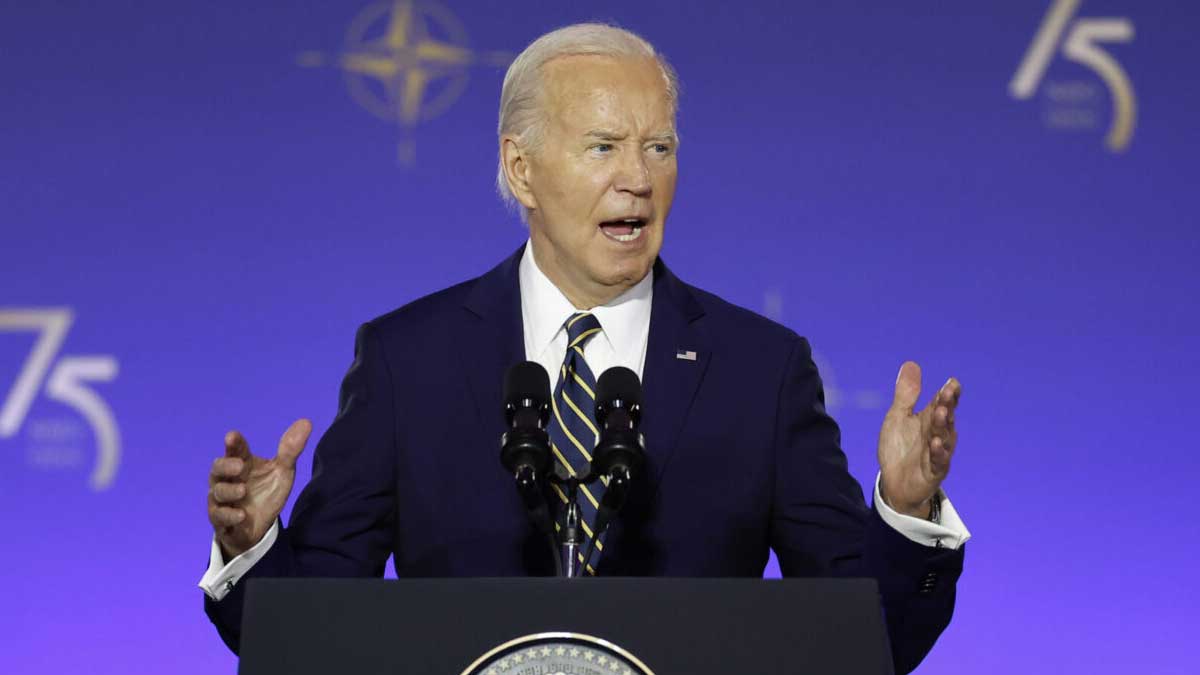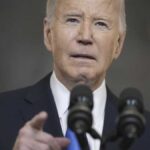- Home
- Billionaires
- Investing Newsletters
- 193CC 1000
- Article Layout 2
- Article Layout 3
- Article Layout 4
- Article Layout 5
- Article Layout 6
- Article Layout 7
- Article Layout 8
- Article Layout 9
- Article Layout 10
- Article Layout 11
- Article Layout 12
- Article Layout 13
- Article Layout 14
- Article Sidebar
- Post Format
- pages
- Archive Layouts
- Post Gallery
- Post Video Background
- Post Review
- Sponsored Post
- Leadership
- Business
- Money
- Small Business
- Innovation
- Shop
Recent Posts
How Democrats Might Choose a New Nominee If Biden Withdraws

On Sunday, President Joe Biden made the surprising decision to withdraw from the 2024 presidential race, triggering an exceptional and potentially disorderly selection process just weeks before the Democratic National Convention is set to convene in Chicago. Biden’s exit has set the stage for an intricate and high-stakes contest to determine his replacement, with Vice President Kamala Harris emerging as a leading candidate due to her significant head start from Biden’s endorsement.
Biden’s immediate endorsement of Harris offers her a considerable advantage over other potential contenders. This move positions her favorably as the Democratic Party grapples with the sudden vacancy at the top of the ticket. Representative James Clyburn, D-S.C., was among the first prominent Democrats to propose a “mini-primary” as a means to identify and evaluate potential replacements for Biden. This proposal has gained traction and support from figures such as New York Times columnist Ezra Klein and veteran Democratic strategist James Carville. The mini-primary concept suggests a preliminary process where prospective candidates could engage in a series of events, including town halls, debates, and public forums, to quickly introduce themselves to voters and delegates.
Should the Democratic Party fail to coalesce around a new nominee prior to the convention, the event could transform from a routine formality into a contentious and high-stakes political battle. Typically, conventions serve to formalize the results of primary elections, but this year’s gathering might witness a dramatic struggle among candidates for the 4,700 Democratic delegates who will ultimately decide the nominee. The standard convention process could be upended if the party remains divided or unable to unify behind a single candidate.
The proposed mini-primary would ideally precede the convention and is intended to expedite the selection of a new nominee. However, the exact mechanics of this process are still unclear. It could involve a rapid series of candidate events designed to familiarize delegates and voters with potential replacements. Despite this, if Biden’s endorsement of Harris remains intact, the necessity for a mini-primary might diminish as Harris could be anointed as the presumptive nominee without further contest.
Another possible scenario is an open convention, where delegates pledged to Biden would have the freedom to vote for any candidate. While this would technically allow for a broad range of choices, Biden’s endorsement of Harris could influence delegates to support her. Alternatively, the party might face a brokered convention, in which delegates arrive uncommitted and negotiate behind the scenes, often leading to multiple rounds of voting. Brokered conventions were once common practice before the 1970s, when the Democratic Party reformed its rules to require delegates to commit to the candidate who won their state’s primary.
Under current convention rules, the 4,000 pledged delegates are expected to reflect the preferences of those who elected them, though they are not legally bound to vote for Biden. If no candidate secures a majority on the first ballot, the pledged delegates, along with 700 unpledged delegates, are free to cast their votes for any candidate on the second ballot. Unpledged delegates, who are not bound by the initial round of voting, would have the opportunity to influence the outcome in subsequent ballots.
The Democratic National Convention is scheduled to take place from August 19-22 in Chicago. Democrats had planned a virtual roll call in early August to meet Ohio’s prior requirement that nominees be selected 90 days before the November 5 election. Although Ohio has since revised this law, the virtual roll call is expected to proceed as initially planned to formalize the nominee ahead of the convention.
Kamala Harris is widely considered the most probable successor to Biden, thanks to her significant advantages beyond Biden’s endorsement. As the current Vice President, Harris has access to Biden’s campaign resources, which would simplify the transition and avoid the logistical complications of reallocating campaign funds to another candidate. Her established name recognition and favorable polling results further bolster her position. Key Democratic figures like Clyburn and former Representative Tim Ryan, D-Ohio, have openly supported Harris as Biden’s potential replacement. Ryan, in particular, called for her nomination in a recent Newsweek op-ed, while Clyburn has voiced support for a mini-primary but expressed willingness to back Harris if such a process were to occur.
James Carville, a prominent Democratic strategist, has cautioned that failing to conduct a mini-primary could create the perception of a rigged process. He has argued that Democrats must engage in a transparent and democratic selection process rather than one determined behind closed doors. Carville’s concerns underscore the importance of maintaining party unity and ensuring that the nomination process is perceived as fair and open.
In addition to Harris, other names frequently discussed as potential replacements include Democratic Governors Gavin Newsom of California, Gretchen Whitmer of Michigan, J.B. Pritzker of Illinois, Andy Beshear of Kentucky, and Jared Polis of Colorado. Whitmer has dismissed speculation about her replacing Biden and denied claims that she discouraged Biden’s campaign. Newsom has consistently expressed support for Biden, despite ongoing discussions about his potential replacement. Pritzker and Beshear have offered measured criticism of Biden and encouraged him to address concerns about his performance, but neither has explicitly called for his withdrawal from the race.
As the Democratic Party navigates this complex and uncertain landscape, the coming weeks will be crucial in determining how the nomination process unfolds and who will emerge as the party’s candidate for the 2024 presidential election.
Recent Posts
Categories
- 193cc Digital Assets2
- 5G1
- Aerospace & Defense46
- AI37
- Arts3
- Banking & Insurance11
- Big Data3
- Billionaires449
- Boats & Planes1
- Business328
- Careers13
- Cars & Bikes76
- CEO Network1
- CFO Network17
- CHRO Network1
- CIO Network1
- Cloud10
- CMO Network18
- Commercial Real Estate7
- Consultant1
- Consumer Tech180
- CxO1
- Cybersecurity68
- Dining1
- Diversity, Equity & Inclusion4
- Education7
- Energy8
- Enterprise Tech29
- Events11
- Fintech1
- Food & Drink2
- Franchises1
- Freelance1
- Future Of Work2
- Games141
- GIG1
- Healthcare78
- Hollywood & Entertainment186
- Houses1
- Innovation42
- Investing2
- Investing Newsletters4
- Leadership65
- Lifestyle11
- Manufacturing1
- Markets20
- Media193
- Mobile phone1
- Money13
- Personal Finance2
- Policy567
- Real Estate1
- Research6
- Retail1
- Retirement1
- Small Business1
- SportsMoney33
- Style & Beauty1
- Success Income1
- Taxes2
- Travel10
- Uncategorized8
- Vices1
- Watches & Jewelry2
- world's billionaires418
Related Articles
Trump Moves $4B Stake in Truth Social Parent, Stock Drops 6%
Donald Trump recently transferred his 57% stake in Trump Media & Technology...
By 193cc Agency CouncilDecember 20, 2024House Rejects Trump-Backed Funding Bill, Shutdown Looms
The U.S. House of Representatives rejected a new government funding bill on...
By 193cc Agency CouncilDecember 20, 2024Trump Named Time’s Person of the Year for Second Time
On Thursday, Time magazine honored Donald Trump as its “Person of the...
By 193cc Agency CouncilDecember 12, 2024Meta Donates $1 Million to Trump’s Inaugural Fund
Meta, the parent company of Facebook and Instagram, has confirmed a $1...
By 193cc Agency CouncilDecember 12, 2024















Leave a comment